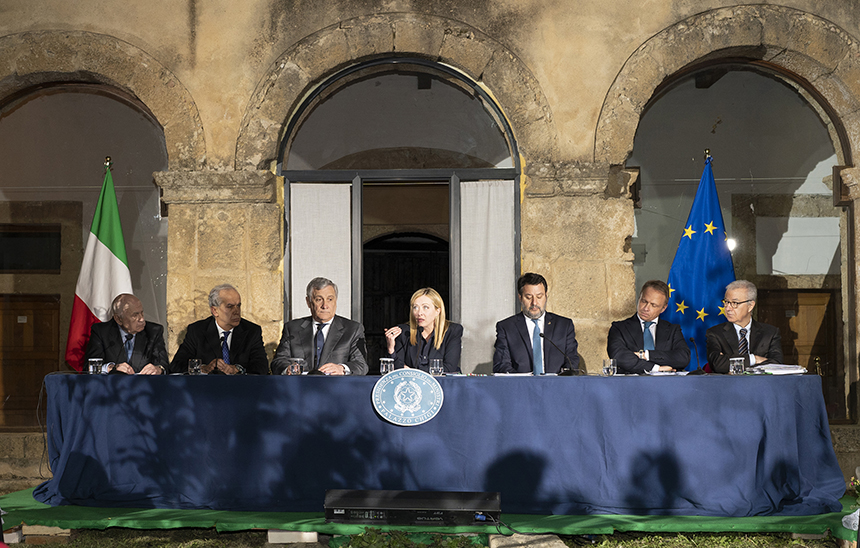Immigration: A policy to build

12.06.2024
Article by Nino Sergi, President Emeritus of INTERSOS, Policy Advisor of LINK 2007
The time has perhaps come to think about a national conference on immigration and asylum. A public event promoted by the President of the Council of Ministers together with the ministers involved, with a prior work of analysis and in-depth analysis that would see the participation of public institutional actors together with those directly involved in assistance, integration, work, education, training, culture, and the experience of immigrant communities. Social organisations, trade unions, entrepreneurs, third sector bodies, international cooperation, diasporas, ecclesial institutions and communities of faith, analysis and research institutes, academic, educational and training institutions called for a broad and involving work to provide policy makers with useful elements to define an immigration policy, which is not yet there.
The subject is regulated by a law that is now 22 years old, the Bossi-Fini. The six legislatures and twelve governments that have followed one another since 2002 have prevented regular debate on such a complex and sensitive subject and the normal evolution of regulations. In the meantime, the world has undergone profound economic, political, demographic and environmental changes that have influenced migration dynamics. Rather than making a few adjustments, a new regulation should be devised that expresses, with adherence to the complexity of the subject, a true migration policy, the absence of which has so far only led to punctual measures without vision or coherence.
At the European level, the Pact on Immigration and Asylum was recently adopted by Parliament and the Council, after years of debate on the Commission’s proposals. It is, however, an agreement linked to the attempt to contain and manage flows, without clarifying what European migration policy is and what vision governs such a far-reaching social fact that cannot be reduced to crisis management and the logic of security or demographic and labour market dynamics alone. The lessons of the last century must not be forgotten: ‘we were looking for arms and men came’, women, children, with their ways of life, their cultures, their projects.
We need to rethink migration. Sociologist Felice Dassetto, professor emeritus at the Catholic University of Leuven, reminds us of this in his recently published essay ‘Migration: un fait total. Nouveaux regards et nouvelles politiques‘: the fact of migration requires us to study and give answers to all the questions it raises, without isolating the migrants’ point of view from that of the societies they arrive in and the societies they leave. Migration has dominated public debate for at least three decades precisely because the questions it raises have not been answered. In the absence of appropriate political solutions, positions have hardened and polemics have replaced debate, with irreconcilable opinions ranging from the opening of ‘fortress Europe’ to walls to prevent immigration. Polemical and ideological tones have frozen positions and produced the impasse we have been in for too long, making it difficult to think about migration in a balanced and rational way, even in order to attempt to build a positive and constructive migration policy in a new way. Yet, one should begin to accept that there are no prefabricated or simple solutions. In our democratic societies, they must be sought together. Immigration is neither good nor bad in itself, Dassetto points out: it is what the actors involved (immigrants and residents, individuals and communities, citizens and institutions) and the social and institutional conditions in which it takes place will make it become.
Once this electoral phase is over, politics should try to open up and confront itself, avoiding fruitless clashes, by listening and inviting confrontation in turn. In Italy there is a rich set of realities with decades of knowledge of both the complexity of immigration and the problems of the countries of origin; an extraordinary wealth of experience, capacity for action and proposals, collaboration with public institutions, and networking with similar realities in European and emigration countries.
The sound and far-sighted governance of immigration is a common concern of these realities and of government institutions, despite their different visions. Dialogue and listening can be the best tool to be able to build immigration policies capable of leading to government choices that are as healthy and far-sighted as possible. These choices are also indispensable to Italy’s positioning and its leading role in common policies at the European level. To be credible, such a role will require a strategy and a political agenda whose implementation begins at home and is dictated by a long vision, far beyond emergency responses.
(Article published by IL RIFORMISTA, 12.06.2024)
Attachments:
